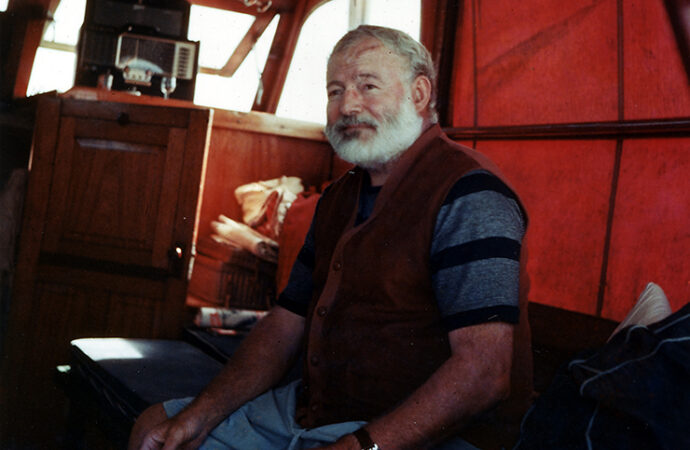I first became a huge fan of Ernest “Papa” Hemingway back in my twenties. I read his short stories, nearly all his novels, and his memoir, A Moveable Feast, recounting the time in Paris when he was just beginning his adventures in fiction. I also read several biographies about him, including Carlos Baker’s classic Ernest Hemingway: A Life Story.
My admiration for his writing continued for many years. I taught The Sun Also Rises in my advanced literature classes and The Old Man and the Sea to my younger students, and I kept reading about the man as well, most recently Paul Hendrickson’s Hemingway’s Boat. Yet the more I learned about “Papa” Hemingway, the less I liked the man.
Now the time has come to say goodbye to Papa for good.
Humberto Fontova discusses Hemingway in the article, “PBS Hemingway Docuseries Covers Up His Communist Connections,” criticizing the program for failing to mention the writer’s documented connections to the Russian KGB and his support for Fidel Castro, including gifts of thousands of dollars to Castro’s cause. Fontova calls Hemingway “a conscious and dedicated communist agent of influence.”
But that betrayal is not what ended my admiration for Hemingway.
In his article, Fontova gives an account of a visit by George Plimpton to Finca Vigía, Hemingway’s home outside of Havana. Plimpton, editor of The Paris Review, visited Finca Vigia at least twice, and later told James Scott Linville, another editor at the magazine, of his second stay at the Hemingway residence. Here is what Linville remembers from Plimpton’s account:
I have long tried to separate the personal lives of artists, writers, and movie stars from their work. The genius who wrote The Great Gatsby, F. Scott Fitzgerald, was often a real jerk. Woody Allen certainly won’t win any awards for his personal life, but I can still laugh at some of his early movies. Caravaggio was a criminal and a murderer, but I very much admire his paintings.
But assuming Linville’s account is true, I think I have reached my limit. Taking friends and beverages out to watch men being butchered for their beliefs is a bridge too far. One might understand had Hemingway viewed this spectacle as an opportunity to record human brutality or to seek some insight into how such an execution is managed, but any man who seats himself in a chair, pours himself a drink, and invites friends to view the execution of their fellow human beings, many of them, we may guess, innocent of their supposed crimes against humanity, is grotesque.
On my shelves are nearly a dozen books either by Hemingway or about him. I’ve decided I will keep those books, and I will always admire his writing and his impact on fiction and the English language. But when I look at them from now on, I won’t feel any admiration for the man, but rather a sickened disdain. They’ll remind me not just of Hemingway’s betrayal of his country and his own humanity, not just of refreshments poured from a shaker to enjoy while watching bound and helpless captives shot to death, but also of all those who today, as Hemingway once did, enjoy the benefits of our American nation while actively seeking its ruin.
His books now stand in my home library as a monument to the ugliness and evil of the totalitarian governments of the last hundred years.
—
Dear Readers,
Big Tech is suppressing our reach, refusing to let us advertise and squelching our ability to serve up a steady diet of truth and ideas. Help us fight back by becoming a member for just $5 a month and then join the discussion on Parler @CharlemagneInstitute and Gab @CharlemagneInstitute!
Image Credit:
Wikimedia Commons – National Archives and Records Administration – Ernest Hemingway Photograph Collection, John F. Kennedy Presidential Library and Museum, public domain
















Leave a Comment
Your email address will not be published. Required fields are marked with *